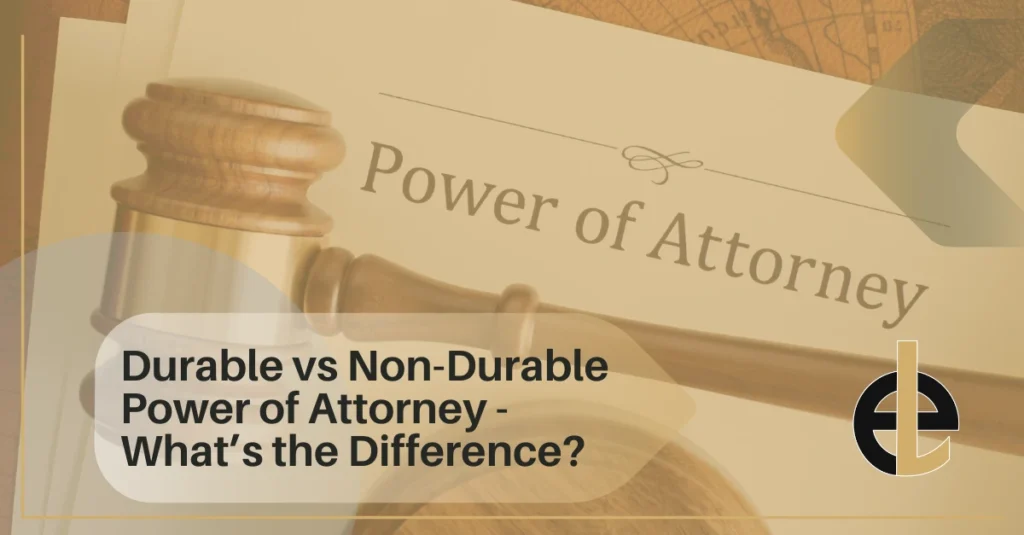Durable vs Non-Durable Power of Attorney: What’s the Difference?

When planning for the future, it is important to think carefully about who will make decisions if you cannot. Many people work with a wills and estates lawyer in Milton to prepare powers of attorney as a key part of their estate plan. However, people often mix up durable and non-durable powers of attorney, which serve different purposes.
Understanding how these documents work can help you choose the best option for your needs in Canada and avoid costly mistakes down the road. In this guide, we clarify these by highlighting the specifics of durable vs non-durable power of attorney.
Understanding Durable vs Non-Durable Power of Attorney
A durable power of attorney stays in effect if you become mentally or physically unable to act. It lets your agent step in when you cannot handle things yourself. It ensures continuity and also lowers stress for your family.
A non-durable power of attorney stops working if you lose mental capacity. It is often used for short-term tasks. These include selling a home while you are away. This type ends the moment you can no longer make choices. That means your agent loses power when they may be needed most.

When comparing durable and non-durable powers of attorney, the main question is about control. Does it continue after a loss of ability? If you want your agent to stay in charge when you cannot decide for yourself, you will want a durable version.
What Does a Power of Attorney Do?
A power of attorney is a legal document that lets someone else make choices for you. This person becomes your agent and enters into an agency relationship, meaning they must follow the limits you give them.
The power can cover money matters, personal care, or both. It may include managing investments or even adding a spouse to your property title, based on what the document allows. Each province has its own rules. Most say the document must be signed while you still understand your options. Some powers end fast, while others stay in place if you lose the ability to decide. This is the key issue in the durable vs non-durable power of attorney debate.
Breaking Down PoA for Health and Personal Care
In Canada, you can also create a power of attorney for health, which covers your medical and personal care if you cannot decide for yourself. This type often takes effect only after a doctor says you are no longer able to make medical decisions.

It is separate from the one for money or property and must be signed while you are still able to. Many people choose to work with a law firm in Burlington to make sure this is drafted well and meets the laws where they live. These powers can include your wishes on healthcare directives, like end-of-life care. They help guide your family and doctors during serious illness.
Differences Between Durable and Non-Durable Powers of Attorney
In a durable vs non-durable power of attorney, the main question is whether the agent can keep acting after you are no longer able to. A durable power keeps going. A non-durable one ends right when your agent may be needed most.
Another key point is how easy it is to cancel or limit them. Both types can include terms for revocation. But with a non-durable power, it ends anyway if you lose capacity. With a durable one, you must take clear steps to stop it unless it ends by law or when you die.
A durable power gives more flexibility for long-term plans. It lets your agent keep helping even if your health changes fast. A non-durable one may work for quick tasks, but may not help in an urgent case.
The termination conditions must be clear in both types. If not, your agent could run into problems using the document. For example, common real estate disputes may happen when banks or real estate offices refuse to accept unclear powers.
Lastly, trust and control matter. Agent responsibilities can include anything from paying bills to handling large deals. If they have financial decision-making powers, they might manage your assets. This is why choosing someone honest and capable matters.
Durable vs. Springing Power of Attorney
Some people choose a middle ground called a springing power of attorney. This type only becomes active when a certain event happens, like a doctor confirms that you cannot make decisions. Until then, it does nothing.
The key point in these two is about timing. A durable power can work right away and through incapacity. A springing power waits for proof before starting, which is why its may cause delays.
Nuances Between Durable and Non-Durable Powers of Attorney Documents
The nuances between durable and non-durable PoA include the kind of powers given. It also defines how many agents are named and how they must report what they do. What happens if the agents do not agree is also a part of this.
Some documents give a wide range of powers, like being able to sell real estate or get a copy of property deed. Others limit actions to small tasks. These parts must be written clearly so your agent and others know the limits of their legal authority.

Also, your agent should know how to handle a power transfer to someone else if needed. If your chosen person is no longer able or willing to act, there should be a backup. Without that, the power ends, and your family might need to go to court.
Applying Durable vs Non-Durable Powers in Canada
Each province in Canada has its own rules for powers of attorney. Names and terms may change, but the aim is usually the same. The person you name as PoA must follow your wishes and the law. Their legal authority ends when you die. After that, your executor duties pass to the person named in your will.
If you do not have one, your family may need to ask a judge to name a guardian or trustee. That process can be slow and costly. A clear, well-written paper can help avoid long waits and court fees. This matters most when picking between a durable vs non-durable power of attorney. The right one can protect your choices if you lose the ability to decide.
Bottom Line
Making a power of attorney is not just about filling in a form. It means picking someone you trust, and giving them the right power. Getting help from a skilled lawyer in estate planning can make all the difference. At Estofa Law, our team not only makes sure you get to the bottom of durable vs non-durable power of attorney, but that your interests and wishes are met from start to finish. Book a consultation with our seasoned wills and estate lawyer today to secure peace of mind.

